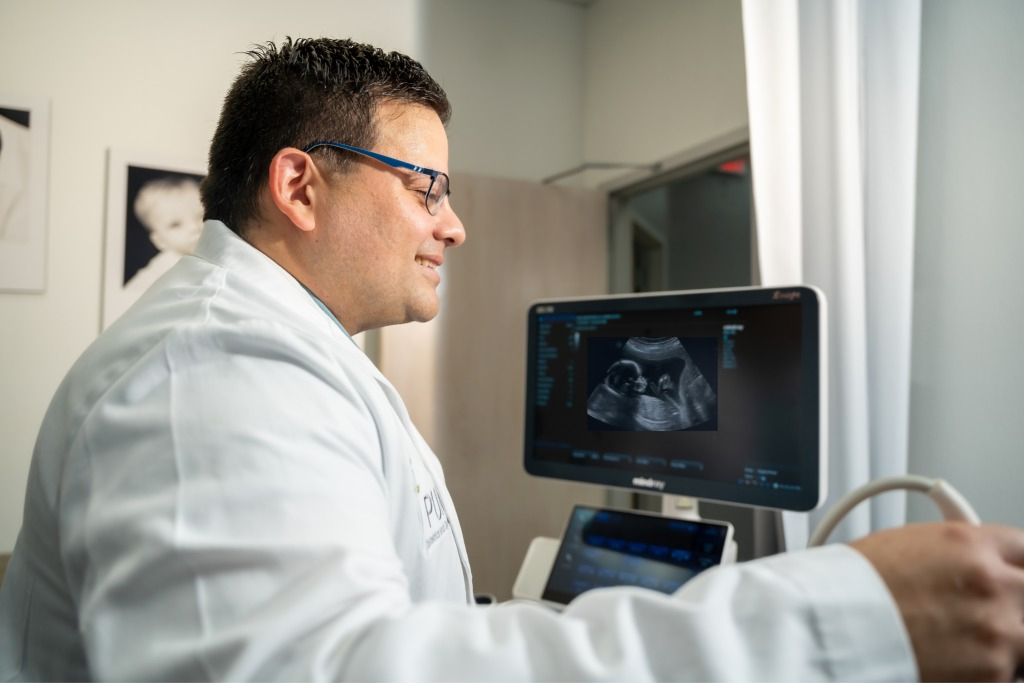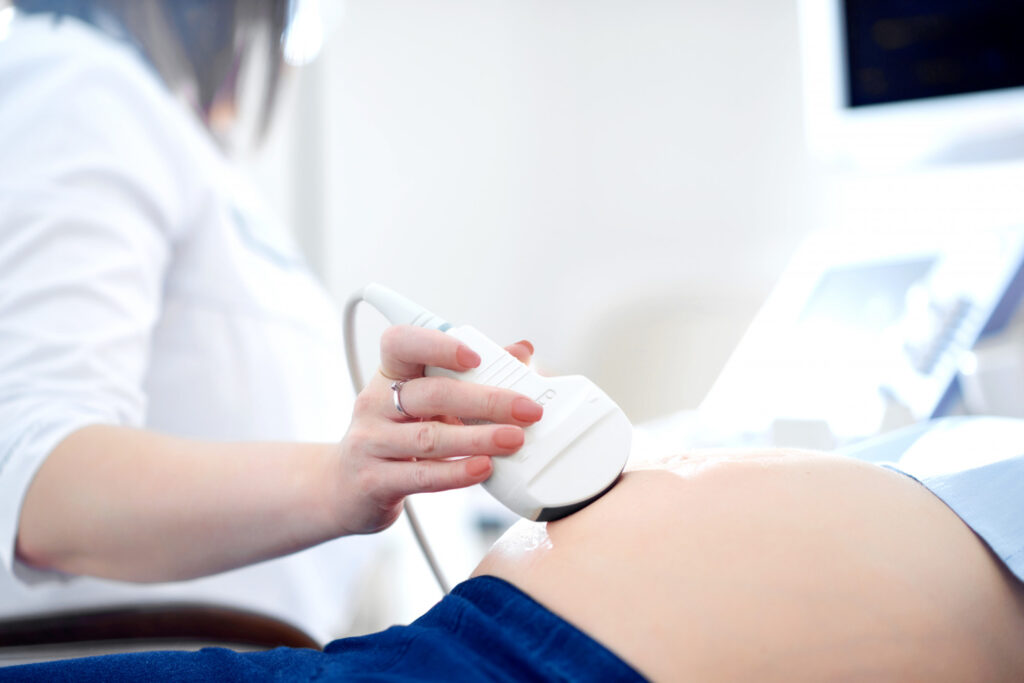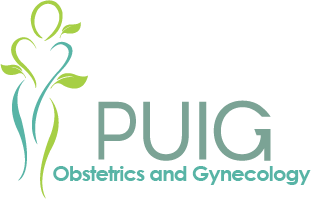OBSTETRICS
Normal and high-risk pregnancy
At Puig Obstetrics and Gynecology, we understand that all pregnancies pose different challenges. Sometimes, either because of fetal morbidity and/or maternal medical conditions, your baby may need to be more closely monitored throughout your pregnancy. Our team is ready to guide you through the management of these conditions to help you deliver a beautiful and healthy baby. We strive to continue to improve through continuing medical education courses to offer you the newest and best treatment plans and cutting-edge technology.
Prenatal Counseling
You may consider coming to see our team at Puig Obstetrics and Gynecology for a prenatal counseling visit if you have a pre-existing medical condition or if you believe you may be at risk of delivering a baby with a birth defect or a genetic condition. This may be because of a personal or family history. Coming to see us for a prenatal counseling visit will help you understand the options for antenatal testing and screening either before or during pregnancy. We may refer you to a medical geneticist if indicated. Other reasons to consider a prenatal counseling visit.
- If you are worried about a genetic condition that runs in your family
- If you have a child affected with a genetic condition and are considering a subsequent pregnancy
- If you have a history of infertility or have had several miscarriages
- If you are concerned that your lifestyle poses a threat to your pregnancy.
- If you are concerned about the risks to pregnancy from advanced maternal age.
Antenatal screening
a) Nuchal translucency
The nuchal translucency ultrasound or NT scan is an ultrasound that is offered between the 11th and 13th week of pregnancy. It measures the space on the back of your baby’s neck and helps us to screen for Down’s Syndrome and other chromosomal anomalies. Puig Obstetrics and Gynecology offers an NT scan certified technician to perform these on all our patients.
b) Non-invasive pregnancy testing
Non-invasive pregnancy testing or NIPT as it is commonly known is testing done to exclude the possibility of certain chromosomal abnormalities in a developing baby. It may also provide your baby’s gender. It is non-invasive because it is performed by drawing blood from the mother and it does not harm your baby. At Puig Obstetrics and Gynecology we have a full in-clinic laboratory with the ability to draw and perform these tests. It is important to remember that a NIPT is a screening test and does not provide a definitive diagnosis. If the NIPT test is positive, you may need a referral for diagnostic testing.

Twin and multiple gestations
Twin and multiple gestations pose specific challenges to the mother and the healthcare providers. Some of these challenges include a higher probability of medical complications such as gestational diabetes, hypertensive disorders of pregnancy, fetal growth anomalies, and a higher incidence of preterm labor. At Puig Obstetrics and Gynecology we are keenly aware of these challenges and work tirelessly to prevent and treat these and other complications. We also work closely with our maternal-fetal medicine partners to provide a team-based health care approach.
Management of gestational and pregestational diabetes mellitus
Diabetes can pose specific challenges to both the mother and the developing baby. Pre-existing diabetes mellitus must be optimized before seeking a pregnancy. Some problems related to diabetes in pregnancy are growth abnormalities in babies, an increased risk for cesarean section, a higher incidence of high blood pressure during pregnancy, a higher probability of preterm birth, and a higher incidence of miscarriage or stillbirth. Important things to keep in mind if you have pre-pregnancy diabetes or develop diabetes during pregnancy are:
- Plan for Pregnancy See your doctor before getting pregnant. Your doctor needs to check on you and determine what effect diabetes has had on your body. Some of the changes that diabetes can cause in your body can be important prognostic factors for your pregnancy. During a pre-pregnancy visit, the importance of glucose control and monitoring can be re-addressed and if you are overweight, diet and exercise can be discussed as part of a treatment plan to control your blood sugar.
- See Your Doctor Early and Often
During pregnancy, a woman with diabetes needs to see the doctor more often than a pregnant woman without diabetes. Together, we can work to prevent or catch problems early. - Eat Healthy Foods
Eat healthy foods from a meal plan made for individuals with diabetes. A dietitian can help you create a meal plan. Healthy meal plans can be found at www.diabetes.org through the American Diabetes Association.
To Find a Dietitian:
American Dietetic Association
1–800–877–1600 - Exercise Regularly
Exercise will help lower your blood sugar by burning some of the calories you eat. After checking with your doctor, you can exercise regularly before, during, and after pregnancy. Aim for 30 minutes of moderate-intensity physical activity at least five days a week. This could be brisk walking, swimming, or actively playing with children. - Take Pills and Insulin as Directed
If diabetes pills or insulin are ordered by your doctor, take them as directed to help control your blood sugar. Not following instructions as indicated can lead to dangerous fluctuations in your blood sugar levels. - Monitor Blood Sugar Often
Pregnancy will change how much energy your body uses and how it uses this energy. Checking your blood sugar levels often and making proper adjustments to your medications, exercise, and your diet can help improve outcomes.


Hypertensive disorders of pregnancy
High blood pressure (hypertension) in pregnancy can have a negative impact on mother and baby during pregnancy as well as at the time of delivery and immediately after delivery (postpartum). If you have high blood pressure, it is important to come to see us as soon as you begin to plan a pregnancy or as soon as you find out you are pregnant. It is important to find out if your high blood pressure has affected how your body functions. During your initial visit to Puig Obstetrics and Gynecology, we will work together to optimize diet, exercise, and weight reduction and discuss the possible use of medications to control blood pressure. Some commonly prescribed blood pressure medications are not safe in pregnancy. During your pregnancy, you will be followed by more frequent prenatal care visits and it will be important that you monitor your blood pressure at home. Possible complications of high blood pressure are pre-eclampsia and eclampsia and knowing the possible symptoms of these conditions will be important.


Obesity in pregnancy
Your weight and the amount of weight you gain in pregnancy can influence your health and the health of your baby. As always, it is important to come to see us before planning a pregnancy to optimize recommendations for diet and exercise. During pregnancy, obesity poses risks to the mother such as the increased risk of failed labor, increased risk of cesarean section, and increased risk of clots in your veins. Obesity may place a developing baby at risk of stillbirth, birth defects, and preterm birth. Important things to consider are:
- Work closely with your health care provider. Ask questions and always follow instructions. More frequent prenatal care visits may be needed.
- Track your weight gain during your pregnancy.
- Eat a healthy and balanced diet.
- Exercise regularly. Consult with us to get recommendations appropriate for you.


Obstetrical Ultrasound
Ultrasound
How does an ultrasound work?
During your ultrasound, you lie on the exam table in a comfortable position, just as with a regular pelvic exam.
Transabdominal ultrasound
Your Puig Obstetrics and Gynecology care provider usually performs transabdominal ultrasounds during your second and third trimesters of pregnancy. He/she applies a gel to your abdomen and then moves the ultrasound probe gently over your skin. The sound waves create an image of your baby to help your OB/GYN track changes and growth.
When is ultrasound used during pregnancy?
There are many reasons that you may need ultrasounds during pregnancy, including:
First trimester
You’ll have an ultrasound at around eight weeks gestation to establish your due date, verify baby’s heartbeat, and check for multiples. First trimester ultrasounds can also check for ectopic pregnancy or miscarriage. The nuchal translucency ultrasound is an optional first trimester screening for birth defects, chromosomal abnormalities, and cardiovascular problems.
Second trimester
Your second trimester ultrasound includes your anatomy assessment at around 18-22 weeks. This ultrasound also monitors growth.
Third trimester
You may need ultrasounds during your third trimester to check your amniotic fluid index, check placenta position, or simply to monitor the baby closely in a high-risk pregnancy.



